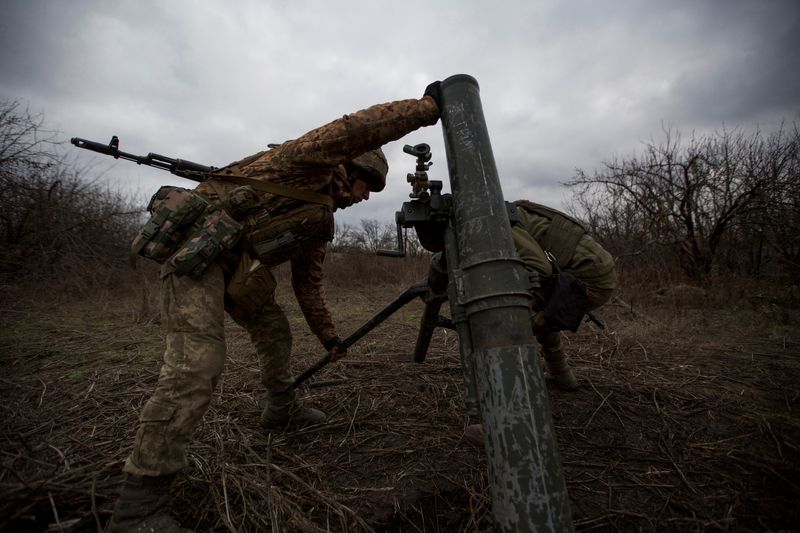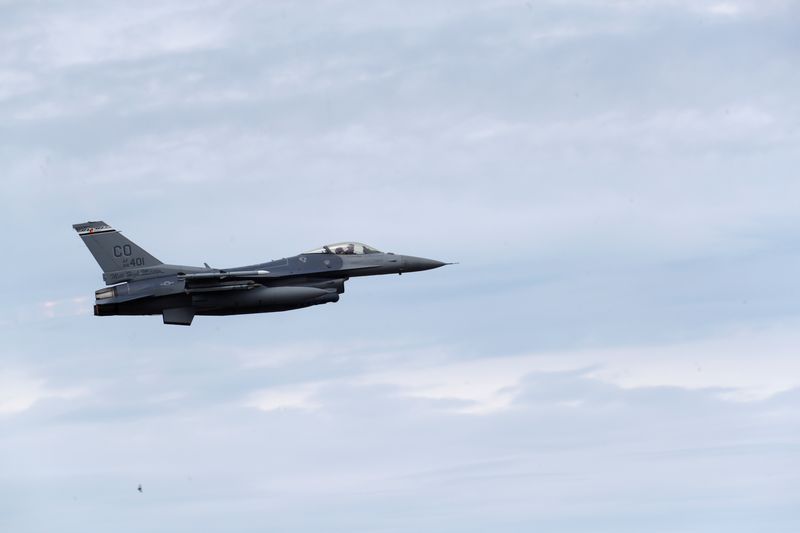By Dan Peleschuk
KYIV (Reuters) -Russia claimed on Tuesday to have captured a village just to the north of Bakhmut, a city it is trying to surround in a major push for what would be its biggest battlefield prize in Ukraine since last summer.
A Belarusian volunteer fighting for Ukraine told Reuters from inside Bakhmut that Russia was shelling the city constantly and its troops were trying to encircle it. Fighting was under way building by building, the volunteer said.
There was no immediate response from Kyiv to Moscow's claim about the village of Blahodatne, and Reuters was not immediately able to verify the situation there. It came three days after the head of Russia's Wagner Group said the mercenary force had seized the village in an attack Kyiv said it had repelled.
Blahodatne, which sits on one of the main roads into Bakhmut about 5 km (3 miles) north, was captured with the help of aerial support, Moscow's defence ministry said.
Russian forces have made clear, if gradual, advances in the area in recent weeks, notably capturing the salt-mining town of Soledar to Bakhmut's north.
Were it to force Ukraine to withdraw from the city that once held 75,000 people, it would be Moscow's first major gain since it took the similarly-sized cities of Sievierodonetsk and Lysychansk in July.
During the fighting for Bakhmut, two civilians, a boy and a 70-year-old-man, were killed by Russian artillery on Tuesday, regional governor Pavlo Kyrylenko said. Four others were wounded in the attack, he said.
Ukrainian military spokesperson Serhiy Cherevaty said in televised comments that the Ukrainian army in Bakhmut had been provided "with everything necessary," after it repelled Russian attempts to gain control of an important supply line.
Separately, a large Russian force has launched an assault against the Ukrainian-held bastion of Vuhledar this week, further south along the same eastern front. Russian officials have claimed to have secured a foothold there, while Kyiv says it has largely repulsed that attack so far.
Britain's Ministry of Defence said the Russian force in the new Vuhledar assault was at least the size of a brigade, a unit typically comprising several thousand troops.
The Russians had advanced hundreds of metres across a river toward Vuhledar and could make more localised gains there, the ministry said in an unusually detailed daily intelligence update. It said the assault on Vuhledar was unlikely to lead to a significant breakthrough, but could be intended to draw Ukrainian efforts away from defending Bakhmut.
MOMENTUM
Despite weeks of intense trench warfare that both sides have compared to a meat grinder, front lines in eastern Ukraine had largely been frozen in place since November after Kyiv recaptured swathes of territory in the second half of 2022.
But momentum has lately swung back towards Russia as it has made incremental gains for the first time since mid-2022.
Military experts say Moscow appears determined to push forward in the coming months before Kyiv receives hundreds of newly pledged Western battle tanks and armoured vehicles for a counter-attack to recapture occupied territory this year.
Ukrainian President Volodymyr Zelenskiy described Russia's push in the east as an attempt at "revenge" for earlier losses.
"We will stop them all, little by little, destroy them and prepare our big counteroffensive," he said on Monday.
Kyiv says the Russian assaults of recent weeks have come at huge cost, initially mostly relying on Wagner mercenaries, including thousands of convicts recruited from Russian prisons and sent into battle in waves with little training or equipment.
But Russia's call-up of hundreds of thousands of reservists late last year means Moscow has now been able to reconstitute regular military units exhausted or depleted earlier in the war.
Western military experts say Bakhmut is not itself of major strategic importance. But it is one of just a few substantial cities in Ukraine's eastern Donbas region still held by Ukraine. Moscow now says taking the full Donbas is a major objective of the "special military operation" it ordered 11 months ago.
F-16: BIDEN SAYS NO
Since winning the Western pledge for tanks after months of lobbying, Kyiv has pressed on with further requests for arms, including calls for jet fighters such as U.S. F-16s. Neither side has been able to secure control of the skies over Ukraine.
The West has so far refused to send weapons that could be used to attack deep inside Russia. U.S. President Joe Biden responded with a flat "No" when asked by reporters at the White House on Monday if Washington would send F-16s.
Still, Ukraine has held out hope. French Defence Minister Sebastien Lecornu said on Tuesday "there is no taboo" when asked about supplying fighter jets to Ukraine. Lecornu spoke after meeting his Ukrainian counterpart Oleksiy Reznikov in Paris.
Reznikov was due also to meet President Emmanuel Macron, who told reporters in The Hague on Monday that "nothing is excluded" when it comes to military help. Macron said any move to send jets would depend on factors including the need to avoid escalation and assurances planes would not "touch Russian soil".
Polish Prime Minister Mateusz Morawiecki also did not rule out a possible supply of F-16s to neighbouring Ukraine, in response to a question from a reporter before Biden spoke.

Morawiecki said on his website that any such transfer would take place "in complete coordination" with NATO. Poland has long called for more aggressive military support for Ukraine.
British Prime Minister Rishi Sunak's spokesperson said on Tuesday London did not believe its own jets would be useful, and given that learning to fly them would take months, it would not be practical to send them to Ukraine.
